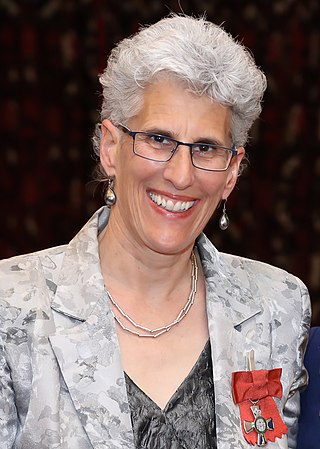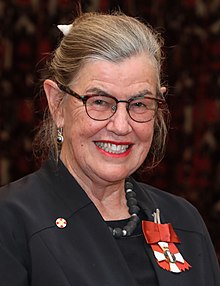
Chapman University is a private research university in Orange, California, United States. Encompassing eleven colleges, the university is classified among "R2: Doctoral Universities – High research activity". The school maintains its founding affiliations with the Christian Church and the United Church of Christ, but is a secular university.
The Deadly Awards, formally titled National Aboriginal and Torres Strait Islander Music, Sport, Arts and Community Awards and commonly known simply as The Deadlys, was an annual celebration of Australian Aboriginal and Torres Strait Islander achievement in music, sport, entertainment and community. The event was hosted by Vibe Australia, founded by Gavin Jones in 1993, and was held from 1995 to 2013, when government funding was cut.

Dame Theresa Elizabeth Gattung is a New Zealand businessperson and the former chief executive of Telecom New Zealand (1993–2007).
The Halberg Awards are a set of awards, given annually since 1949, recognising New Zealand's top sporting achievements. They are named for New Zealand former middle-distance runner and Olympic gold medalist Sir Murray Halberg. The initial award was handed out in 1949, and continued until 1960 under the auspices of the NZ Sportsman magazine. Since 1963, the awards have been organised by the Halberg Disability Sport Foundation, and the number of award categories has grown to eight.

The Māori Women’s Welfare League or Te Rōpū Wāhine Māori Toko I te Ora is a New Zealand welfare organisation focusing on Māori women and children. It held its first conference in Wellington in September 1951.

The Chapman Tripp Theatre Awards were the main theatre awards in New Zealand's capital city, Wellington, from 1992–2014, and have been succeeded by the Wellington Theatre Awards.
Tania Karen de Jong is an Australian soprano, social entrepreneur, businesswoman, motivational speaker, and event producer. She is the founder of Creative Innovation Global, Creative Universe, Creativity Australia, Dimension5, Music Theatre Australia, Pot-Pourri, and the Song Room, and co-founder of Mind Medicine Australia. De Jong was named one of the "100 Most Influential People in Psychedelics" globally by Psychedelic Invest in 2021.

Philippa Lynne Howden-Chapman is a professor of public health at the University of Otago, Wellington, and the director of the New Zealand Centre for Sustainable Cities.

The Kate Sheppard Memorial Trust Award is an award made annually on September 19, known as Suffrage Day, in New Zealand. This day is the anniversary of women winning the right to vote in New Zealand in 1893.

Frances Valintine is an education futurist from New Zealand. She has won numerous awards for her educational programmes and is the Founder and Chair of The Mind Lab and Tech Futures Lab. and Tech Futures Lab. Frances is known for her commitment to working to improve the outcomes for the next generation through contexualising education delivery and content in the 21st century.

The New Zealand Women of Influence Awards are an annual set of awards which recognise women who make a difference to everyday New Zealanders' lives. The Awards were first made in 2013 and were initially sponsored by Westpac Bank. In 2016, Stuff NZ became a joint sponsor.
Cecilia Robinson, originally from Sweden, is a New Zealand entrepreneur and founder of the My Food Bag business.
The 2018 Voyager Media Awards were presented on 11 May 2018 at Cordis, Auckland, New Zealand. Awards were made in the categories of digital, feature writing, general, magazines, newspapers, opinion writing, photography, reporting and videography.
The 2017 Canon Media Awards were presented on 19 May 2017 at The Langham, Auckland, New Zealand. Awards were made in the categories of digital, feature writing, general, magazines, newspapers, opinion writing, photography, reporting and videography. The Wolfson scholarship, health journalism scholarships, and awards for editorial executive and outstanding achievements, were also presented.
The 2019 Voyager Media Awards were held at the Cordis, Auckland on 17 May 2019. Awards were made in the categories of digital, feature writing, general, magazines, health journalism, scholarships, newspapers, opinion writing, photography, reporting and videography.

Diana Wichtel is a New Zealand writer and critic. Her mother, Patricia, was a New Zealander; her father, Benjamin Wichtel, a Polish Jew who escaped from the Nazi train taking his family to the Treblinka extermination camp in World War II. When she was 13 her mother brought her to New Zealand to live, along with her two siblings. Although he was expected to follow, she never saw her father again. The mystery of her father's life took years to unravel, and is recounted in Wichtel's award-winning book Driving toTreblinka. The book has been called "a masterpiece" by New Zealand writer Steve Braunias. New Zealand columnist Margo White wrote: "This is a story that reminds readers of the atrocities that ordinary people did to each other, the effect on those who survived, and the reverberations felt through following generations."

Sarah Isabella Leberman is a New Zealand sport management academic, as of 2012 is a full professor at the Massey University.

Ranjna Patel is the founder of the Gandhi Nivas family violence prevention programme in New Zealand.
The National Netball League is a New Zealand netball league. Since 2016 it has served as a second-level league, initially below the ANZ Championship and later below the ANZ Premiership. It is organised by Netball New Zealand. Between 2016 and 2020, due to sponsorship and naming rights arrangements, the NNL was known as the Beko Netball League. Since 2022, the league has been sponsored by Synergy Hair and, as a result, it is also known as the Synergy Hair National League. The teams in the competition are effectively the reserve teams of ANZ Premiership teams. Netball South won the inaugural title in 2016. Central Zone/Central Manawa have been the league's most successful team, winning three titles in a row between 2017 and 2019. A limited number of matches are broadcast live on Sky Sport.

Dame Julie Clare Chapman is a New Zealand charity founder. She founded the KidsCan Charitable Trust in 2005, and Pet Refuge New Zealand in 2017. In December 2024, she was appointed a Dame Companion of the New Zealand Order of Merit, for services to children and the community.

















